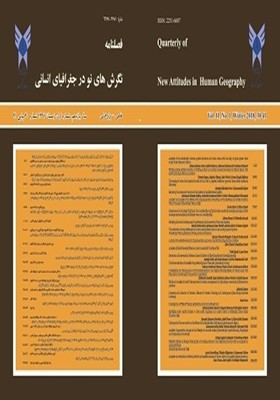آیندهپژوهی فضای ژئوپلیتیکی پساداعش در منطقه غرب آسیا (مطالعه موردی عراق)
محورهای موضوعی : کالبدیبهروز دریکوند 1 , کیومرث یزدان پناه درو 2 * , محمد اخباری 3
1 - دانشجوی دکترای جغرافیای سیاسی، واحد تهران مرکزی، دانشگاه آزاد اسلامی، تهران، ایران
2 - استادیار دانشکده جغرافیا، گروه جغرافیای سیاسی دانشگاه تهران
3 - دانشیار جغرافیای سیاسی، واحد تهران مرکزی، دانشگاه آزاد اسلامی، تهران، ایران
کلید واژه:
چکیده مقاله :
چکیده غرب آسیا بخشی مهمی از جهان اسلام است که از نقطه نظر تاریخی و مسائل سیاسی و سوق الجیشی اهمیت ویژهای دارد؛ که شامل سرزمینهای میان دریای مدیترانه و خلیج فارس و تا منطقه جنوب خاوری اروپا، جنوب باختری آسیا و شمال آفریقا گسترده است. این منطقه از مهمترین مناطق ژئوپلیتیکی و ژئواستراتژیکی جهان است که با تبدیل شدن این منطقه به جولانگاه گروههای تروریستی نوظهور سلفی تکفیری و سپس حرکت بهسوی ساختار پسا داعش عرصهای پیچیده و پر بحران را در برابر تمامی بازیگران و قدرتهای منطقهای و جهانی قرار داده است. این منطقه به دلیل قابلیتها و توانمندیهای ویژه در عرصههای مختلف اقتصادی، سیاسی، اجتماعی و امنیتی بهخصوص در طی دههای اخیر بهعنوان منطقهای راهبردی که با موقعیت ژئوپلیتیکی، ژئواستراتژیکی و ژئواکونومیکی باعث شده که همواره در پیش برد طرحهای راهبردی غرب بهخصوص آمریکا برای تأمین منافع و ماندگاری در منطقه و حفظ حائل امنیتی رژیم صهیونیستی جایگاه منحصر به فردی داشته است. کشورهای سوریه و عراق در جبهه مقاومت، دونقطه از کانونهای تزریق بحران و بیثباتی توسط گروههای تروریست تکفیری داعش در جنگ نیابتی محور ژئوپلیتیک وابسته به رهبری آمریکا در منطقه به شمار میرفتند، حالا با توجه به این تحولات رقابت ژئوپلیتیکی و تغییرات ساختار گذار ژئوپلیتیک منطقهای و فرا منطقهای در این کشورها متمرکز شده است. از طرفی دیگر کشورهای عراق، سوریه و یمن نیز به محل رقابت و منازعه و در هم آمیختگی قلمرو ژئوپلیتیکی جمهوری اسلامی ایران، ترکیه، عربستان تبدیلشده است. این پژوهش با استفاده از روش توصیفی– تحلیل و پیمایشی با استفاده از منابع کتابخانهای – اینترنتی و اسنادی که به تحلیل آیندهپژوهی فضای ژئوپلیتیکی پسا داعش در منطقه غرب آسیا (مطالعه موردی عراق) پرداخته است؛ که رقابتها و چالشها میان جبهه مقاومت با محور وابسته به غرب در منطقه را در فضای پسا داعش تحلیل نموده که تحول حذف داعش و پوستاندازی منطقه از محور ژئوپلیتیک وابسته به سمت محور ژئوپلیتیک غیر وابسته (مقاومت) در هدف پژوهشی هست.
References
Campbell, Jeffrey & Harquay, Robert (2004), "Middle East Strategic Geography", Vol. I and II, Translated by Seyyed Mehdi Hosseini Matin, Tehran: Research Institute for Strategic Studies.
Feirahi, Dawood (2013), "The Initiative in the Dialogue of Dr. Dawud Fīrhi", Official Website of the Congregation, http://www.islahweb.org/content
M. Mir Heydar, valley (1999). "Geopolitics: Presenting a New Definition". Quarterly journal of geographic research. Year 13, No. 4. Mashhad: Winter 1998. Jatehdzadeh, Victory (2002). Political Geography and Geographic Policy. Side, Tehran
Bagheri, Hussein (2013). "Internal actors in the new political structure of Iraq and its impact on the national security of the Islamic Republic of Iran", Afqah Security, Quarterly, No. (19), Pages. 165-135.
Eamalipour Roshan, Ali Asghar, "Geopolitical Analysis of Power Networks in Post-ISIS Iraq: A Model for the Prevention of Regional American Influence", Quarterly Journal of Human Resource Negotiations, Year 9, No. (3), Summer 2016 Pages. 98-79.
Ezzati, Ezzatollah (2000). Geopolitics Tehran: Publication of the side
Hafez Nia, Mohammad Reza (2005). Unpublished leaflet of the political geography of the Islamic world. 8/9/2005: Tarbiat Modarres University.
Lacoste, Eve (1999), "Geopolitical Issues of Islam, Sea, Africa," translated by Abbas Aqani, Tehran: Publishing Office.
Lavender, Leicester Jordan, Tory. (2002), "An Introduction to Cultural Geography", translated by Simin Tuliya and Mohammad Soleimani, Tehran: Research, Culture, Arts and Communication
Lewis, Bernard (2015), "The Crisis of Islam in the Holy War, the Unholy Assassination," by Dr. Kayumars Yazdan Panah Dor, First Edition, Tehran: Scientist.
Mohammadian Ali, Torabi. Qassim, "Explaining the Impact of Iraqi Developments on the Climate of Kurdistan", Political Science Series, Eighteenth, No. (72), Winter, 2017, p. 140-121.
Montazeran Javid, the victim. Saeed, "Scenarios for the future of Iraq and the analysis of the legal, international and security prospects of the Islamic Republic of Iran", Strategic Policy Studies General Policy, Period 7, Number 24, Autumn 2013, p. 91-74
Morley, Milton, Eduardo. Peter, Hinch. Kalitov, (2006). "The Middle East Crisis," translated by Shahrzad Rastegar Shariat Panahi, Tehran: Gomes.
Najat, Seyyed Ali (2015), "ISIL Corruption Analysis, Organization Structure, Strategies and Consequences", First Edition, Tehran: Publication of the International Institute of Cultural Studies and International Studies, Abrar Contemporary
Talebi Arani Roohollah, "The rise of ISIL and transformation in the behavior of the Kurds (Syria and Iraq)," Quarterly Journal of Political Studies, Islamic World, Sixth, No. (2), Summer, 2016, p. 150-127
The sequence, François (2003), "Shiite geopolitics", translated by Katyun Baser, Tehran: Wistar.
Tiskerkani Fawzi, Yahya (1998), Organization of the Islamic Conference, Structure, Performance and Its Relations with Iran, Tehran: Center for Islamic Revolution Documents.
Yazdan Panah Daro, Kiyomars, Kamrani Hassan, Ranjbari. Kamal, "Analysis on the Geopolitics of the Kurdistan Region of Iraq after the collapse of ISIL", Journal of the International Journal of Geographical Society of Iran, Fifteenth, No. (53), Summer 2017, Pages. 54-31

